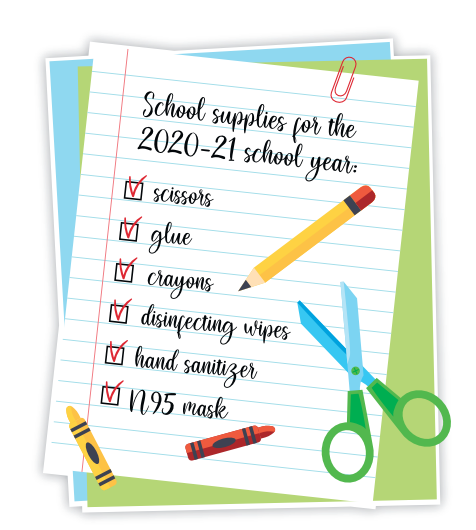 |
How should families prepare to go back to school? That’s quite a question this year, isn’t it? After all, education is likely to look different depending on what school you attend, so how can we even tackle this topic? I felt a little guilty even asking anyone to write on this topic, but I thought it was an important one. After the unprecedented end to school this past spring, many students and their parents are still reeling. Entering into that kind of uncertainty again is making many of us apprehensive about this new school year. Enter authors Rachel Blum and Dan Nommensen, who rose to the challenge and offer great thoughts to help prepare families for any “back to school” situation. Make sure to read both of their articles.
— Nicole Balza
THE COMMON PHRASE “back to school” has so many different thoughts and feelings attached to it this year beyond the usual feelings of excitement and nervousness. Since students, parents, and teachers cannot know exactly what to expect, how can we prepare ourselves to go back to school and to be successful when we do?
First and foremost, I recommend choosing a Bible passage for your family to study and memorize as you begin a school year that may look different than years past. This will help anchor you in God’s Word and give your entire family God’s peace in the midst of change. One such passage is Philippians 4:6,7, “Do not be anxious about anything, but in every situation, by prayer and petition, with thanksgiving, present your requests to God. And the peace of God, which transcends all understanding, will guard your hearts and your minds in Christ Jesus.”
We know that kids (and adults) are going to have lots of questions, feelings, and worries as they transition to a new school year. Parents and teachers need to plan on spending time with each child, giving them multiple opportunities to share their thoughts and feelings. Sharing God’s Word with our kids while they share their feelings and thoughts with us will help them to develop courage and resilience in difficult situations. We can never spend too much time listening to those we love and teaching and modeling for our children how to go to God in prayer, trusting him with our concerns.
Sharing God’s Word with our kids . . . will help them to develop courage and resilience.
Parents can also prepare kids for school by reading with them; reintroducing bedtimes and morning routines; and giving them opportunities to listen, be respectful, and be responsible at home. Teachers are already planning how to teach kids in the 2020–21 school year, knowing that the end of the previous year was not quite what we all would have liked it to be. If parents send kids to school well-rested and well-practiced at listening and following through with completing tasks at home, they will be ready to tackle academics and the changes they may face this school year.
Finally, teachers and parents are not going to have all the answers this fall. Even when we make decisions, we will not all agree. It will be an opportunity to work on our communication skills and to dialogue honestly about our feelings and thoughts. As we teach our children to turn to God in all things, we will want to practice this habit as well and remain grounded in his Word so that we can love and support those around us. John reminds us of this in 1 John 4:16, “We know and rely on the love God has for us. God is love. Whoever lives in love lives in God, and God in them.” Let us share the love of Christ with our kids, their teachers, and other families as we embark on this school year together!
Rachel Blum
 DO YOU NOTICE a few additions to the school supply list this year? Hand sanitizer? Mask? Some of you might just be thrilled to receive a supply list because it means your kids might actually return to school! In fact, there might not be much on that list that you would not buy so your child can return to school.
DO YOU NOTICE a few additions to the school supply list this year? Hand sanitizer? Mask? Some of you might just be thrilled to receive a supply list because it means your kids might actually return to school! In fact, there might not be much on that list that you would not buy so your child can return to school.
Strong emotions are normal
Of course, none of us knows how this school year will go. Some schools may start this fall at home. Others may offer a combination of home and school learning. And that could change at any point throughout the school year.
Doesn’t it seem hard to make decisions these days as everyone tries to draw information from various sources to help balance public health and our regular way of life? In the beginning of the pandemic, it seemed decisions made one day changed the next day. How could we have ever imagined schools across the country moving to an entirely offsite format within a matter of weeks?
It was a transition for kids and parents—some moving through that transition smoothly, some needing more time to make that adjustment. For many parents, the idea of returning to anything that resembles that time brings some strong emotions that we can identify with such as being trapped, scared, frantic, anxious, uncontrolled, vulnerable, frustrated, or confused.
I get it. When it comes to the safety and welfare of our children, we all have very strong emotions. Parents, as you and your kids return to school this fall, in whatever way that looks like, I would like to encourage you with an account from Scripture in Matthew 14:22-33, Jesus walking on water.
Your Savior’s hand is reaching out to you and your family through these upcoming changes in the school year.
After seeing Jesus walking on the water toward their boat, Peter believed Jesus would protect him, got out of the boat, and began walking on the water toward Jesus. Then Peter saw that wind and began to sink. Imagine the emotions that Peter experienced that moment, moving from the exhilaration of walking on water toward his Savior to turning his focus on the wind and fearing death.
Make sure to communicate
What Peter did next is a great example for us: “But when he saw the wind, he was afraid and, beginning to sink, cried out, ‘Lord, save me!’ ” (v. 30).
Peter is often noticed for his doubt in that moment, but we also see that Peter “cried out.” He did not forget to ask Jesus for help. He did not try to figure out how to do a back float and save himself. He did not keep his request quiet because he did not want to bother Jesus or look weak in front of the other disciples. Instead, he communicated with his Savior and cried out to him.
Parents, as you feel your emotions building—communicate. Communicate with your Lord and be strengthened in the Word. Then communicate with your teachers, principal, other parents, or another support network. Acknowledge one another’s emotions as you face these changes together. Be united in your goal of caring for your child and let your communication lead to solutions.
Accept help from your Savior
“Immediately Jesus reached out his hand and caught him” (v. 31).
We will struggle with doubt through these times. We will have those times when we see the winds in ourlife like Peter and begin to fall. But know that your Savior is not here to punish you for that doubt. He already took our punishment on the cross. Jesus did not let Peter sink ten feet under the water to teach him a really good lesson. “Immediately Jesus reached out his hand.” Your Savior’s hand is reaching out to you and your family through these upcoming changes in the school year, through a job loss, through sickness, or through any other moment of distress or challenge.
Parents, as we get our children ready to head back to school, remember to communicate through the transitions. Communicate with your school, others in your support network, and your Lord.
Dan Nommensen
Authors: Multiple authors
Volume 107, Number 08
Issue: August 2020
- Parent conversations: How can parents and kids manage stress?
- Parent conversations: What do your prayers for your children include?
- Parent conversations: How do we resist making our parenting law-based?
- Parent conversations: What Bible passages do you turn to most as a parent?
- Parent conversations: How can we help kids develop positive, healthy habits?
- Parent conversations: What tactics do you use to encourage children to tackle difficult tasks?
- Parent conversations: How can we model good listening skills for our kids?
- Parent conversations: How do we help our kids move on from mistakes?
- Parent conversations: How can we instill gratitude in our children?
- Parent conversations: How can parents find the balance between being too restrictive and too permissive?
- Parent conversations: How can we teach kids to be good friends?
- Parent conversations: What life skills will help young people as they transition to adulthood?
- Parent conversations: How do we discuss death with our children?
- Parent conversations: What does it look like for a father to be a strong Christian leader?
- Parent conversations: How can we help young adults stay engaged in the church?
- Parent conversations: What do parents need to know about video games?
- Parent conversations: How do parents not let worry get the best of them?
- Parent conversations: How do we teach our kids to value all people?
- Parent conversations: When parenting philosophies differ
- Parent conversations: How can we help today’s overwhelmed teens?
- Parent conversations: How can parents maintain a healthy marriage?
- Parent conversations: You might be a Lutheran parent if . . .
- Parent conversations: Parenting post–high school: What is a parent’s role?
- Parent conversations: How can families use the hymnal in their worship life at home?
- Parent conversations: What should Christian parents teach their children about gender?
- Parent conversations: What is vocation? How does it apply to parenting?
- Parent conversations: Why do siblings fight? How should I react when they are fighting?
- Parent conversations: How do we teach children resilience?
- Parent conversations: How do I approach vaccines as a Christian parent?
- Parent conversations: How can I explain the Sixth Commandment to a young child?
- Parent conversations: How can I help my child have an optimistic outlook?
- Parent conversations: What if we can’t follow our Christmas traditions this year?
- Parent conversations: What are ways to foster a rich prayer life in children?
- Parent conversations: How can I let the gospel shine as I parent?
- Parent conversations: How should I handle a child’s separation anxiety?
- Parent conversations: How should families prepare to go back to school?
- Parent conversations: How does a teen’s brain work?
- Parent conversations: How much should I monitor my child online?
- Parent conversations: How can parents reassure children during an uncertain time?
- Parent conversations: How can I stay calm when my child is out of control?
- Parent conversations: Should I give something up for Lent?
- Parent conversations: How can I keep my child engaged in attending church?
- Parent conversations: How can we help a stressed-out kid?
- Parent conversations: How can we nurture a proper view of “stuff”?
- Parent conversations: How involved should parents be in a child’s homework?
- Heart to heart: Parent conversations: Are we modeling kindness for our children?
- Heart to heart: Parent conversations: What’s the best parenting advice you’ve received or given?
- Heart to heart: Parent conversations: How should we handle it when people undermine our parenting decisions?
- Parent conversations: How can we prepare children for summer camp?
- Heart to heart: Parent conversations: What’s a parent’s role as a child dates?
- Heart to heart: Parent conversations: How do parents find contentment?
- Heart to heart: Parent conversations: How can we help a family with a sick parent?
- Heart to heart: Parent conversations: How can parents model healthy cell phone use?
- Parent conversations: How can we protect kids without scaring them?
- Parent conversations: What does your family’s bedtime routine look like?
- Parent conversations: What do I need to consider before I give my child a cell phone?
- Parent conversations: How can we teach gentleness and strength at the same time?
- Parent conversations: What should we do when our children grow silent?
- Parent conversations: What should we teach our children about the Reformation?
- Parent conversations: Do we want our children to be leaders or followers?
- Parent conversations: How does a parent’s role change over time?
- Parent conversations: How should I handle a disagreement with my child’s teacher?
- Parent conversations: What are the building blocks of a strong parent/child relationship?
- Parent conversations: What is our goal as parents?
- Parent conversations: What Christmas traditions do you cherish in your family?
- Parent conversations: How can we raise a generation that cherishes life?
- Parent conversations: What are the best Bible story books for family devotions?
- Parent conversations: Why should children obey their parents?









